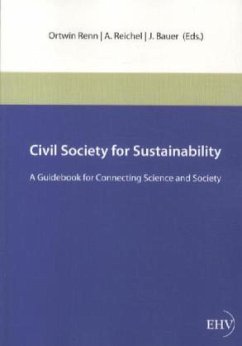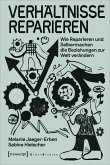Civil society and its organisations (CSO) play a vital role in the implementation of and social change towards sustainable development (SD). Civil society actors exhibit special features: They are to a large degree driven by visions and ideals, they place a focus on common action thus balancing individual and collective goals. CSO participate in and initiate as well as organise discourses about SD in society. Through their activities, social capital is built, maintained and increase. CSO provide and share a non-economical,non-efficiency driven world view to the implementation process of SD.
This guidebook gives an insight to the impact of CSO on governance processes towards SD from three different viewpoints:
1. Theoretical perspectives on Civil Society and Sustainability reflects on theoretical concepts of Civil Society and its contribution to SD
2. Case studies from practice on Civil Society and Sustainability give insights from Implementation Practice and shows tools and methods
3. Examples from collaboration between Science and Civil Society show how science and civil society can cooperate for innovative concepts of reaching SD
Case studies and examples are the combined results of the research project Civil Society for Sustainability , funded under the 7th Framework Research Program of the European Union, and presentations and discussions from the International Conference on Connecting Civil Society and Science: A Key Challenge for Change towards Sustainable Development in October 2011 in Stuttgart, Germany. The Editor, Ortwin Renn serves as full professor and "Chair of Environmental Sociology and Technology Assessment" at Stuttgart University (Germany). He directs the "Interdisciplinary Research Unit for Risk Governance and Sustainable Technology Development" (ZIRN) at Stuttgart University and the "non-profit company DIALOGIK", a research institute for the investigation of communication and participation processes in environmental policy making. Renn also serves as Adjunct Professor for "Integrated Risk Analysis" at Stavanger University (Norway) and as Affiliate Professor at the Harbin Institute of Technology and Beijing Normal University.
This guidebook gives an insight to the impact of CSO on governance processes towards SD from three different viewpoints:
1. Theoretical perspectives on Civil Society and Sustainability reflects on theoretical concepts of Civil Society and its contribution to SD
2. Case studies from practice on Civil Society and Sustainability give insights from Implementation Practice and shows tools and methods
3. Examples from collaboration between Science and Civil Society show how science and civil society can cooperate for innovative concepts of reaching SD
Case studies and examples are the combined results of the research project Civil Society for Sustainability , funded under the 7th Framework Research Program of the European Union, and presentations and discussions from the International Conference on Connecting Civil Society and Science: A Key Challenge for Change towards Sustainable Development in October 2011 in Stuttgart, Germany. The Editor, Ortwin Renn serves as full professor and "Chair of Environmental Sociology and Technology Assessment" at Stuttgart University (Germany). He directs the "Interdisciplinary Research Unit for Risk Governance and Sustainable Technology Development" (ZIRN) at Stuttgart University and the "non-profit company DIALOGIK", a research institute for the investigation of communication and participation processes in environmental policy making. Renn also serves as Adjunct Professor for "Integrated Risk Analysis" at Stavanger University (Norway) and as Affiliate Professor at the Harbin Institute of Technology and Beijing Normal University.








